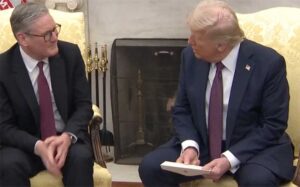
British officials have begun classifying sensitive trade documents as “secret” and “top secret” in a bid to shield key information from American counterparts, as relations between London and Washington strain under President Trump’s tariff war, Business Matters has learned.
The move marks a significant shift in internal government protocols, underscoring concerns over the potential misuse or interception of UK economic data during ongoing trade discussions with the US. Sources confirmed that updated guidance has been issued across departments involved in negotiating the UK’s post-Brexit trade relationships, with stricter rules on digital sharing and document access—particularly relating to sensitive sectors such as automotive and pharmaceuticals.
The shift comes as Trump’s White House continues to rattle global markets with sweeping tariffs on trading partners. The UK has been hit with 10% tariffs on all exports to the US and a punitive 25% rate on cars and steel, prompting mounting unease in Whitehall.
In a marked departure from the transparency seen during negotiations with the Biden administration, the UK’s Department for Business and Trade has elevated the classification of many documents. Previously labelled as “Official – sensitive (UK eyes only)”, many are now subject to restrictions typically reserved for high-level security materials.
A senior source close to the matter said: “The reclassification isn’t about severing ties with the US, but reflects the increased volatility and unpredictability of current US policy under Trump. With industries exposed to retaliatory tariffs, ministers and officials are being cautious about who sees what.”
Despite this, Downing Street has avoided direct confrontation. Prime Minister Keir Starmer has declined to retaliate against Trump’s trade actions, instead offering concessions in areas like digital taxation and agricultural standards, while continuing to prioritise a long-term trade deal with the US.
In a bid to smooth over tensions, US Vice President JD Vance said on Tuesday that a “great agreement” was still possible, and praised the cultural alignment between the two countries. “We’re certainly working very hard with Keir Starmer’s government,” Vance said. “There’s a real cultural affinity.”
Yet behind the scenes, many UK policymakers and business leaders are concerned about the broader implications of Trump’s “America First” strategy. The reclassification of trade documents is part of a broader tightening of security, with large UK-based multinationals—particularly pharmaceutical firms—being advised to adopt stricter communication protocols when interacting with government departments.
The developments reflect broader international apprehension. Reports from Brussels suggest the European Commission has begun issuing burner phones to staff visiting the US and is rethinking its document-handling policies to avoid American surveillance.
While the UK and US have traditionally enjoyed close ties—particularly in defence and intelligence, where shared material is often marked “UK/US only” or classified under the “Five Eyes” alliance—trade policy now appears to be diverging from that intimacy.
Trump’s aggressive tariff strategy is seen as a bid to reindustrialise key sectors of the US economy, including automotive and pharmaceutical manufacturing, often at the expense of long-standing allies. He has defended the moves, acknowledging the “transition costs” but insisting they are necessary for national renewal.
Meanwhile, the fallout continues. US tariffs on Chinese goods have soared to 145%, prompting retaliatory tariffs from Beijing of up to 125%. China has warned that it may resort to alternative countermeasures, and urged the EU to resist what it described as Trump’s “bullying”.
While Trump recently agreed to delay further tariffs on some nations for 90 days, the UK continues to face duties on core exports. The uncertainty is also contributing to instability in global financial markets, prompting questions about the long-term viability of traditional alliances in a shifting trade environment.
As Starmer’s government walks the tightrope between diplomacy and national interest, the reclassification of trade documentation marks a new era in Britain’s handling of sensitive negotiations—and signals that trust, even among allies, is no longer assumed.
Read more:
UK classifies trade documents as ‘secret’ to shield from US amid escalating Trump tariff tensions

